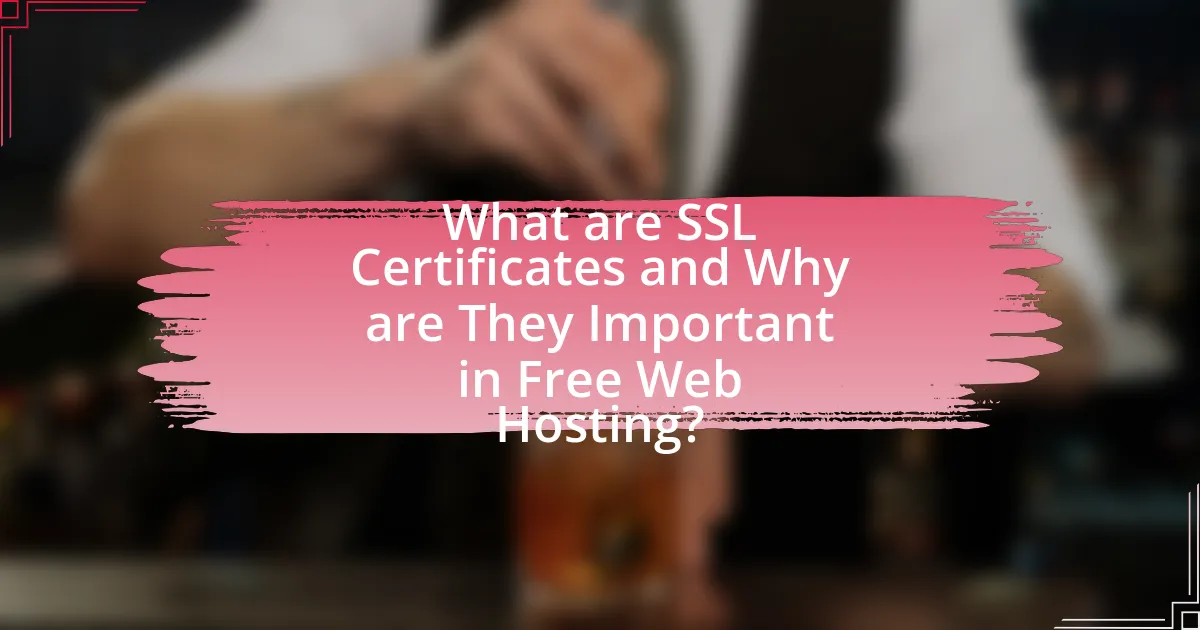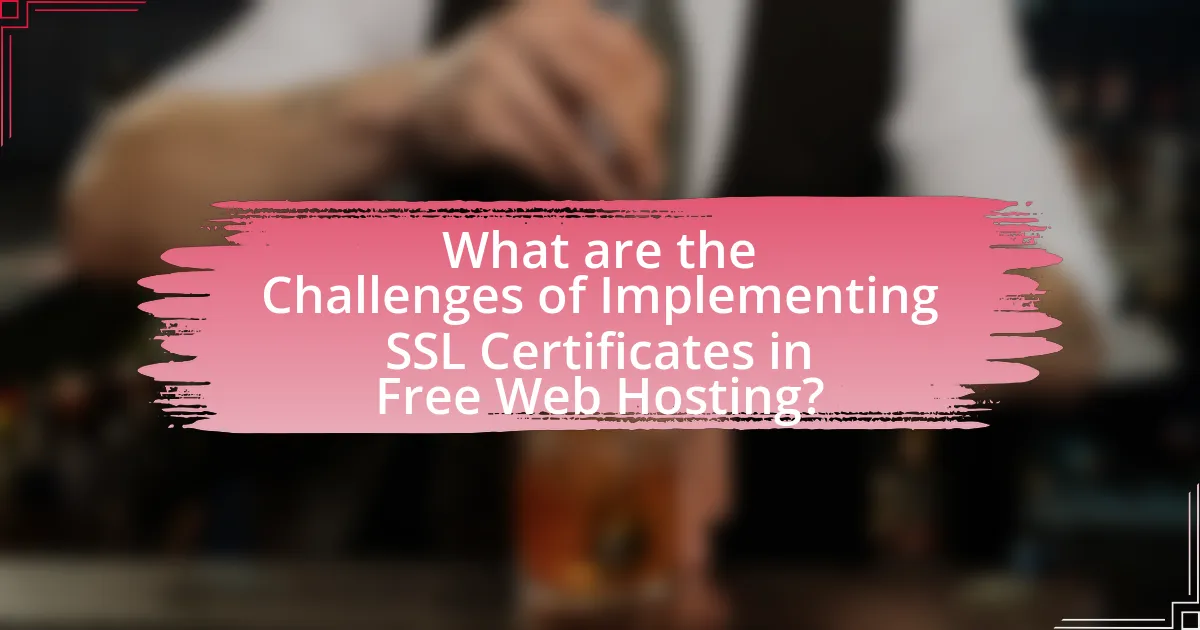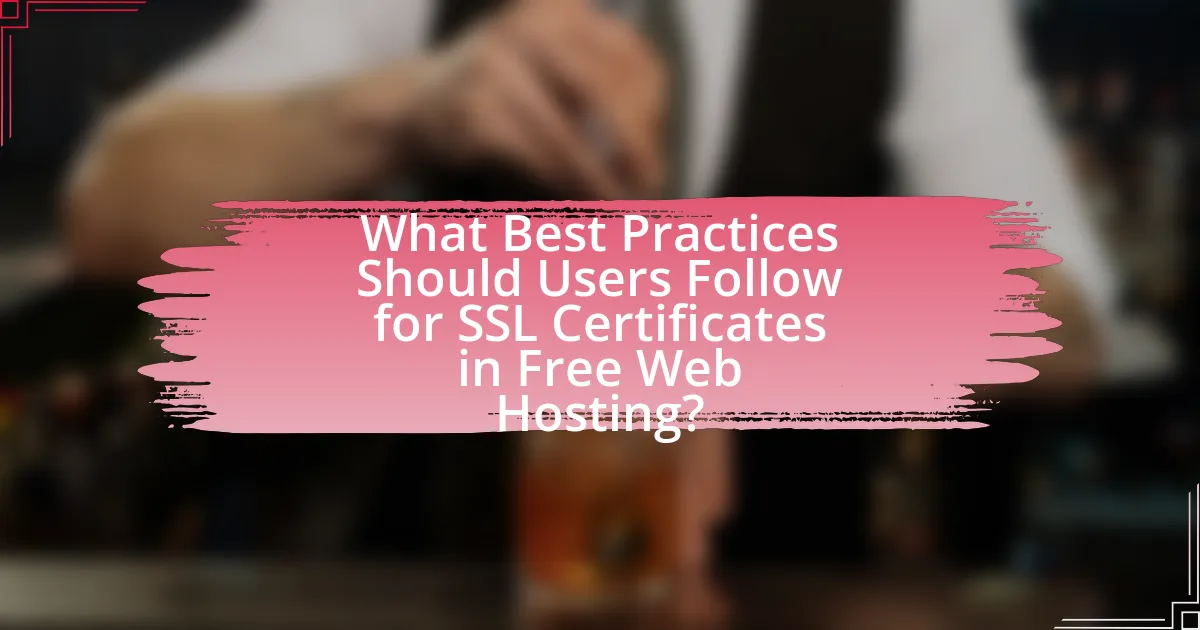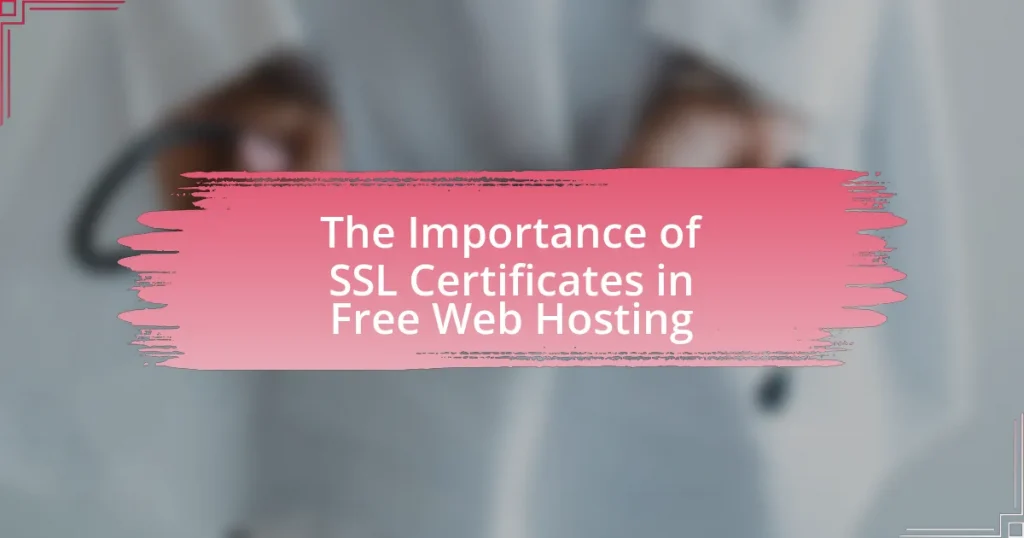SSL certificates are essential digital certificates that authenticate website identities and encrypt data exchanged between servers and clients, significantly enhancing security in free web hosting environments. This article outlines the critical functions of SSL certificates, including their role in protecting sensitive user data, improving search engine rankings, and building user trust. It also addresses the challenges of implementing SSL certificates in free hosting, such as resource constraints and misconceptions, while providing best practices for users to secure their websites effectively. Additionally, the article highlights the importance of maintaining data integrity and the impact of SSL certificates on website credibility and user engagement.

What are SSL Certificates and Why are They Important in Free Web Hosting?
SSL certificates are digital certificates that authenticate the identity of a website and encrypt information sent between the server and the client. They are important in free web hosting because they enhance security by protecting sensitive data, such as personal information and payment details, from interception by malicious actors. Additionally, SSL certificates improve search engine rankings and build trust with users, as browsers display warnings for sites without SSL, potentially deterring visitors. According to a 2021 study by Google, over 80% of users abandon sites that do not have SSL, highlighting the necessity of SSL certificates for maintaining user engagement and credibility in free web hosting environments.
How do SSL Certificates function in the context of web hosting?
SSL certificates function by establishing a secure, encrypted connection between a web server and a browser, ensuring that data transmitted remains private and integral. In the context of web hosting, SSL certificates authenticate the identity of the website, which helps prevent man-in-the-middle attacks and builds user trust. According to a study by GlobalSign, 84% of consumers would abandon a purchase if they found a website untrustworthy, highlighting the importance of SSL in securing online transactions. Additionally, search engines like Google prioritize HTTPS websites, which use SSL, in their rankings, further emphasizing the necessity of SSL certificates for web hosting.
What are the key components of an SSL Certificate?
The key components of an SSL Certificate include the public key, the private key, the certificate authority (CA) signature, the domain name, and the expiration date. The public key is used for encrypting data, while the private key is kept secret and used for decrypting that data. The certificate authority signature verifies the authenticity of the certificate, ensuring that it was issued by a trusted entity. The domain name indicates the specific website the certificate is issued for, and the expiration date specifies the validity period of the certificate. These components work together to establish a secure connection between a web server and a browser, protecting sensitive information during transmission.
How does encryption work in SSL Certificates?
Encryption in SSL Certificates works by establishing a secure connection between a web server and a browser through a process called the SSL handshake. During this handshake, the server presents its SSL Certificate, which contains a public key. The browser verifies the certificate’s authenticity with a trusted Certificate Authority (CA) and then generates a unique session key, encrypting it with the server’s public key. This encrypted session key is sent to the server, which uses its private key to decrypt it. Once both parties have the session key, they can communicate securely, ensuring that data transmitted between them is encrypted and protected from eavesdropping. This method of encryption is based on asymmetric cryptography for the initial key exchange and symmetric cryptography for the actual data transmission, providing both security and efficiency.
What security benefits do SSL Certificates provide for free web hosting?
SSL Certificates provide essential security benefits for free web hosting by encrypting data transmitted between users and the website, ensuring that sensitive information remains confidential. This encryption protects against eavesdropping and man-in-the-middle attacks, which are common threats in unsecured environments. Additionally, SSL Certificates help establish trust with users by displaying visual indicators, such as the padlock icon in the browser, which can enhance user confidence in the website’s security. According to a study by Google, websites with SSL Certificates experience lower bounce rates and higher conversion rates, demonstrating the importance of SSL in fostering user trust and engagement.
How do SSL Certificates protect user data?
SSL certificates protect user data by encrypting the information transmitted between a user’s browser and a web server. This encryption ensures that sensitive data, such as passwords and credit card numbers, cannot be intercepted or read by unauthorized parties during transmission. According to the Internet Engineering Task Force (IETF), SSL (Secure Sockets Layer) and its successor TLS (Transport Layer Security) protocols utilize cryptographic techniques to secure data, making it nearly impossible for attackers to decipher the information without the appropriate decryption keys. This level of security is crucial for maintaining user privacy and trust, especially in free web hosting environments where data vulnerabilities may be more prevalent.
Why is data integrity crucial for free web hosting services?
Data integrity is crucial for free web hosting services because it ensures that the data stored and transmitted remains accurate, consistent, and trustworthy. Without data integrity, users may experience data loss, corruption, or unauthorized access, which can lead to compromised security and loss of user trust. For instance, a study by the Ponemon Institute found that 60% of small businesses that experience data breaches go out of business within six months, highlighting the severe consequences of compromised data integrity. Therefore, maintaining data integrity is essential for protecting user information and sustaining the reliability of free web hosting services.
What impact do SSL Certificates have on website credibility?
SSL certificates significantly enhance website credibility by establishing a secure connection between the user and the website. This security is indicated by the presence of HTTPS in the URL, which reassures users that their data is encrypted and protected from potential threats. Research shows that 84% of consumers abandon a purchase if they perceive a lack of security on a website, highlighting the direct correlation between SSL certificates and user trust. Furthermore, search engines like Google prioritize HTTPS websites in their rankings, further reinforcing the importance of SSL certificates in building credibility and improving visibility online.
How do SSL Certificates influence user trust?
SSL certificates significantly enhance user trust by providing a secure, encrypted connection between the user and the website. This encryption protects sensitive information, such as personal data and payment details, from potential interception by malicious actors. Research indicates that 84% of users abandon a purchase if they perceive a lack of security on a website, highlighting the critical role SSL certificates play in fostering confidence. Furthermore, the presence of SSL certificates is visually indicated by a padlock icon in the browser’s address bar, which reassures users that their data is secure. This visual cue, combined with the technical assurance of encryption, establishes a trustworthy environment, ultimately influencing users’ decisions to engage with a website.
What role do SSL Certificates play in search engine rankings?
SSL certificates play a significant role in search engine rankings by enhancing website security, which is a ranking factor for search engines like Google. Websites secured with SSL are prioritized in search results because they provide a safer browsing experience for users, reducing the risk of data breaches and increasing trust. Google officially announced in 2014 that HTTPS would be a ranking signal, indicating that sites with SSL certificates could achieve better visibility in search results compared to non-secure sites. This emphasis on security aligns with user preferences for safe online interactions, further reinforcing the importance of SSL certificates in improving search engine rankings.

What are the Challenges of Implementing SSL Certificates in Free Web Hosting?
Implementing SSL certificates in free web hosting presents several challenges, primarily due to limitations in server access and support. Free web hosting services often do not provide the necessary infrastructure or technical support to install and manage SSL certificates effectively. For instance, many free hosts restrict users from accessing server settings, which are essential for SSL configuration. Additionally, some free hosting providers may not support the latest SSL protocols or may impose restrictions on the types of certificates that can be used, limiting options for users. These factors can lead to security vulnerabilities, as users may resort to less secure methods or fail to implement SSL altogether, undermining the primary purpose of SSL, which is to secure data transmission.
What limitations do free web hosting services face regarding SSL Certificates?
Free web hosting services often face significant limitations regarding SSL Certificates, primarily due to the lack of support for custom SSL installations. Many free hosting providers do not offer SSL certificates at all, or they may only provide basic, shared SSL options that do not secure the domain name directly. This can lead to trust issues for users, as browsers may flag sites without proper SSL as insecure. Additionally, free hosting services may impose restrictions on the types of SSL certificates that can be used, limiting options to self-signed certificates that do not provide the same level of trust as certificates issued by recognized Certificate Authorities. These limitations hinder the ability of websites hosted on free platforms to establish secure connections, which is critical for protecting user data and enhancing search engine rankings.
How do resource constraints affect SSL Certificate implementation?
Resource constraints significantly hinder SSL Certificate implementation by limiting the financial and technical resources necessary for acquiring, installing, and maintaining certificates. Organizations with tight budgets may struggle to purchase certificates from reputable Certificate Authorities, leading to reliance on free or self-signed certificates that lack trustworthiness. Additionally, insufficient technical expertise can result in improper installation or configuration, exposing websites to security vulnerabilities. According to a 2021 survey by the Internet Security Research Group, 60% of small businesses cited cost as a barrier to implementing SSL, highlighting the direct impact of resource limitations on secure web hosting practices.
What are the common misconceptions about SSL Certificates in free hosting?
Common misconceptions about SSL certificates in free hosting include the belief that free SSL certificates are not secure, that they are only suitable for personal websites, and that they do not provide the same level of trust as paid certificates. In reality, many free SSL certificates, such as those provided by Let’s Encrypt, offer robust encryption and are widely trusted by browsers. Additionally, free SSL certificates can be used for commercial websites and are increasingly accepted by users as a sign of security. According to a 2021 survey by W3Techs, over 30% of websites use HTTPS, many of which utilize free SSL certificates, demonstrating their effectiveness and reliability in securing online communications.
How can users overcome SSL Certificate challenges in free web hosting?
Users can overcome SSL Certificate challenges in free web hosting by utilizing services that offer free SSL certificates, such as Let’s Encrypt. These services provide automated certificate issuance and renewal, making it easier for users to secure their websites without incurring costs. Additionally, users should ensure their web hosting provider supports SSL installation and offers clear documentation on the process. According to a report by the Electronic Frontier Foundation, Let’s Encrypt has issued over 300 million certificates, demonstrating its reliability and widespread adoption in the industry.
What alternatives exist for obtaining SSL Certificates in free hosting environments?
Free hosting environments can obtain SSL certificates through several alternatives, including Let’s Encrypt, Cloudflare, and self-signed certificates. Let’s Encrypt provides free, automated SSL certificates that are widely accepted and easy to implement, making it a popular choice for users of free hosting services. Cloudflare offers a free SSL option as part of its content delivery network (CDN) services, allowing users to secure their websites without additional costs. Self-signed certificates can also be created at no cost, although they may not be trusted by browsers, which can lead to security warnings for users. These options ensure that even those using free hosting can implement SSL security effectively.
How can users ensure proper SSL Certificate installation?
Users can ensure proper SSL Certificate installation by following a systematic approach that includes generating a Certificate Signing Request (CSR), obtaining the SSL certificate from a trusted Certificate Authority (CA), and correctly configuring the web server to use the certificate. First, generating a CSR involves creating a key pair and submitting the CSR to the CA, which validates the request and issues the SSL certificate. Next, users must install the certificate on their web server, ensuring that the server is configured to serve the certificate correctly, which may involve updating server settings or using specific commands depending on the server type. Finally, users should verify the installation using online tools like SSL Labs’ SSL Test, which checks for proper configuration and identifies any potential issues. This process is crucial as improper installation can lead to security vulnerabilities and trust issues with visitors.

What Best Practices Should Users Follow for SSL Certificates in Free Web Hosting?
Users should ensure that they obtain SSL certificates from reputable providers, even in free web hosting environments. This practice is crucial because SSL certificates encrypt data transmitted between users and websites, enhancing security and building trust. Additionally, users should regularly update their SSL certificates to avoid expiration, as expired certificates can lead to security warnings and loss of credibility. Furthermore, users should verify that their SSL certificates are properly installed and configured, as misconfigurations can expose vulnerabilities. According to a study by Google, websites with SSL certificates rank higher in search engine results, demonstrating the importance of SSL for both security and visibility.
What steps should users take to secure their free hosted websites with SSL?
To secure free hosted websites with SSL, users should first obtain an SSL certificate from a trusted provider. Many free hosting services offer free SSL certificates through integrations with services like Let’s Encrypt. After acquiring the certificate, users must install it on their web server, which typically involves accessing the hosting control panel and following the installation instructions provided by the hosting service. Once installed, users should ensure that their website is configured to redirect all traffic from HTTP to HTTPS, enhancing security by encrypting data transmitted between the server and users. Regularly checking the SSL certificate’s validity and renewing it before expiration is also essential to maintain secure connections. These steps are crucial as SSL certificates encrypt sensitive information, protect user data, and improve search engine rankings, making them vital for any website, including those hosted for free.
How can users verify the validity of their SSL Certificates?
Users can verify the validity of their SSL certificates by checking the certificate details through their web browser or using online SSL checker tools. Browsers display SSL certificate information when users click on the padlock icon in the address bar, revealing details such as the issuer, expiration date, and domain name. Online tools like SSL Labs’ SSL Test provide comprehensive analysis, including certificate chain validation and security configuration. These methods ensure that the SSL certificate is correctly installed and trusted by major browsers, confirming its validity.
What maintenance practices are essential for SSL Certificate management?
Essential maintenance practices for SSL certificate management include regular monitoring of certificate expiration dates, timely renewal of certificates, and ensuring proper installation and configuration. Monitoring expiration dates is crucial because SSL certificates typically have a validity period ranging from 90 days to two years; failing to renew them can lead to website downtime and loss of trust from users. Timely renewal ensures that the website remains secure and compliant with industry standards. Proper installation and configuration involve verifying that the certificate is correctly set up on the server and that it matches the domain name, which is essential for maintaining secure connections. Regular audits of SSL configurations can also help identify vulnerabilities and ensure compliance with best practices.
What resources are available for learning more about SSL Certificates?
To learn more about SSL Certificates, several resources are available, including online courses, documentation from certificate authorities, and cybersecurity websites. Websites like SSL Labs provide detailed guides and testing tools for SSL implementation, while platforms such as Coursera and Udemy offer courses on web security that cover SSL Certificates in depth. Additionally, the official documentation from major certificate authorities like Let’s Encrypt and DigiCert offers comprehensive information on obtaining and managing SSL Certificates. These resources are widely recognized in the industry for their accuracy and relevance, making them reliable for anyone looking to understand SSL Certificates better.
Where can users find reliable information on SSL Certificate providers?
Users can find reliable information on SSL Certificate providers through reputable technology websites, industry forums, and official certification authority websites. Websites such as SSL Labs, Let’s Encrypt, and DigiCert provide comprehensive guides, reviews, and comparisons of various SSL Certificate providers, ensuring users access accurate and up-to-date information. Additionally, user reviews on platforms like Trustpilot and G2 can offer insights into the experiences of other customers with specific providers, further validating the reliability of the information.
What online tools can assist in SSL Certificate management?
Online tools that assist in SSL Certificate management include SSLMate, Let’s Encrypt, and DigiCert. SSLMate provides automated SSL certificate issuance and renewal, simplifying the management process for users. Let’s Encrypt offers free SSL certificates and an automated renewal process, making it accessible for various web hosting environments. DigiCert specializes in high-assurance SSL certificates and provides a comprehensive management platform that includes monitoring and renewal notifications. These tools enhance security and streamline the management of SSL certificates, which is crucial for maintaining trust in free web hosting services.
What are the common troubleshooting tips for SSL Certificates in free web hosting?
Common troubleshooting tips for SSL certificates in free web hosting include checking the certificate installation, ensuring the domain name matches the certificate, verifying the certificate’s expiration date, and confirming that the web server is configured to use SSL. Proper installation can be verified through online SSL checkers, which provide detailed reports on potential issues. Mismatched domain names can lead to browser warnings, while expired certificates will cause security alerts. Additionally, ensuring that the web server settings are correctly configured to handle HTTPS requests is crucial for proper functionality.















